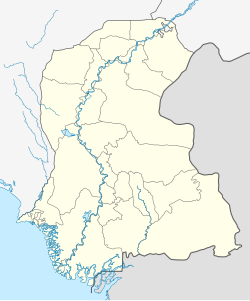| Shri Panchmukhi Hanuman Mandir | |
|---|---|
شری پنکھ مکھی ہنومان مندر | |
 | |
| Religion | |
| Affiliation | Hinduism |
| District | Karachi East District |
| Deity | Panchamukhi Hanuman |
| Festivals | Diwali, Holi, Hanuman Jayanti |
| Location | |
| Location | Soldier Bazaar |
| State | Sindh |
| Country | |
| Geographic coordinates | 24°51′38.2″N67°01′14.1″E / 24.860611°N 67.020583°E |
| Architecture | |
| Type | Hindu Temple |
| Date established | around 500 AD |
| Temple(s) | 1 |
| Website | |
| Official website | |
The Panchmukhi Hanuman Mandir is a historic Hindu mandir in Karachi, Pakistan. [1] The mandir was declared as a national heritage under the Sindh Cultural Heritage (Preservation) Act 1994 and is believed to be at least 1,500 years old. [2]





